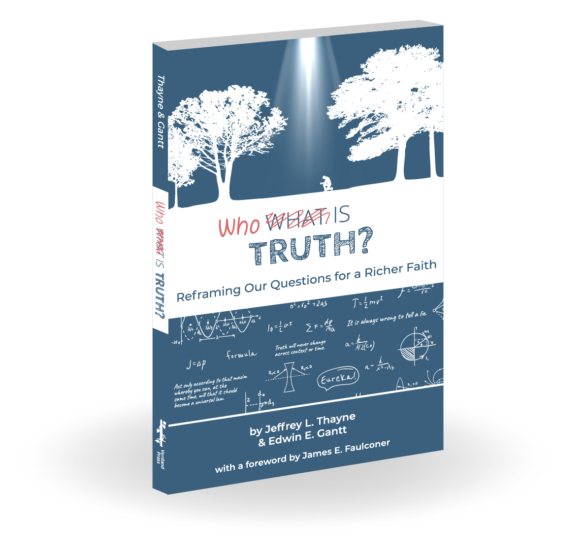
Nearly two thousand years ago, Christ’s followers asked, “How can we know the way?” Christ’s reply was simple and profound: “I am the way, the truth, and the life” (John 14:6). What happens if we take this literally, rather than merely as a metaphor? How do our questions — and our faith — change when we think of truth as a living, breathing person instead of as a set of abstract ideas? The answer to this question is explored in a new book published by Verdand Press called Who Is Truth? Reframing our Questions for a Richer Faith.

Written by Jeffrey Thayne and Ed Gantt, the book is written for Latter-day Saints who wish to re-examine their faith in a way that strengthens their faith in the Restoration of the Gospel. The book explores how Western philosophical assumptions subtly bias the questions we ask about our faith, and how this sometimes fuels the “faith crises” that some members experience. Many of our questions may not have answers because they start with the wrong premises, like looking for the corner of a round room.
In contrast, Hebrew thought offers a glimpse into a worldview that raises altogether different questions, questions which are less biased towards doubt and which lean more towards fidelity to our covenants and to Christ. The books shares insights related to how we understand prophets, the Atonement, sin and repentance, the temple, and our relationship with Christ.
James Faulconer, a professor of philosophy at Brigham Young University and currently a fellow at the Wheatley Institution, wrote a Foreword for the book, in which he said, “Thayne and Gantt give us an overview of how thinking in a more ancient way changes … our understanding. In turn, that new understanding brightens and freshens the Gospel.”
Who Is Truth? can be purchased as a paperback or as an ebook on Amazon.


How lovely. I’ll have to check it out (although my TBR pile is going to topple over an bury me any day now). Does it relate faith in more of an eastern way then?
[click] (The sound of 1-click buying the Kindle edition.)
I haven’t finished it yet, but….
The main theme seems to be Greek/Western thought versus Hebrew/Eastern thought.
I like how the book uses “person-truth” to counter the problem of absolutism/perfectionism.
Absolutism and perfectionism seem to be problems of the Greek/Western thought model (paradigm).
Yet we humans are so imperfect and narrow-minded, and so varied ourselves, that we can’t comprehend how God’s perfections relate to our varied conditions and situations. So instead of focusing on the myriad ways in which “rules” apply to the very wide and varied conditions and people, the authors emphasize our _relationship_ to the _person_ of the Savior. And they extend that in analogies to called and authorized church leaders.
I haven’t gotten far enouh into the book to see exactly where the authors are taking the reader. I may end up disagreeing with their destination/conclusion.
But the book has a very interesting, and logical, take on the Savior’s invitation to “follow _me_”.
I have long thought that the scriptures are more literal than most Christians, even most LDS, realize. The authors seem to back that up, using the Greek versus Hebrew worldview/thought-model to illustrate _how_ they are literal.